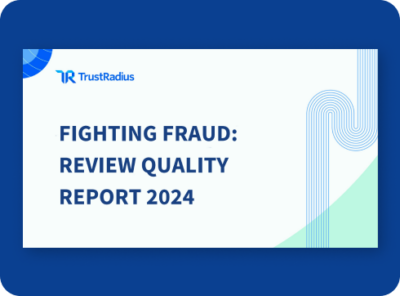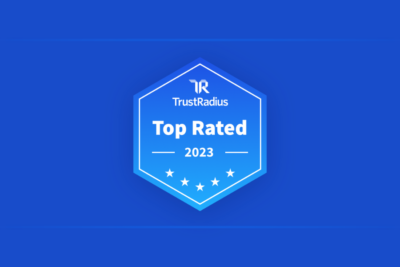How to Sell to Millennial B2B Buyers
B2B sellers entered uncharted territory in 2021.
Not only are we facing an unpredictable post-pandemic economy. The fundamentals of B2B buying and selling have drastically changed.
We explored several of those critical changes in the 2021 B2B Buying Disconnect. Start there for an overview of what B2B sellers should expect this year. But there’s one shift that warrants a deeper dive: the rise of millennial B2B buyers.
It’s finally happened. The tech buying community is now majority millennial. And as you’ll see in the brand new data below, millennial B2B buyers have new expectations for the buyer’s journey.
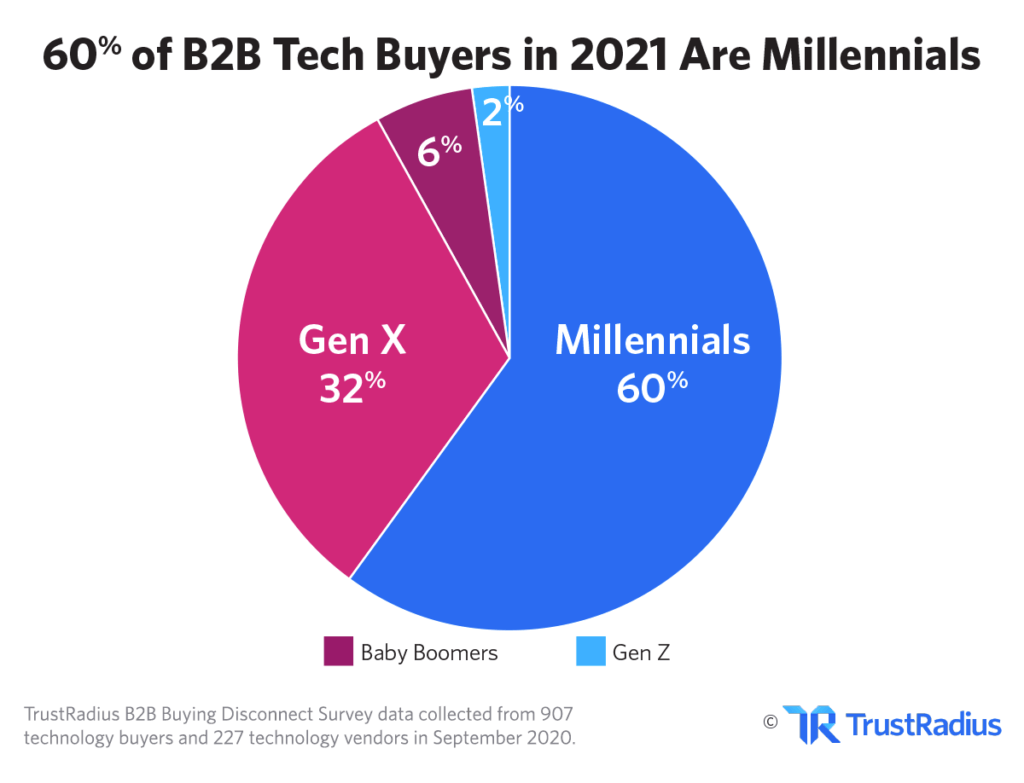
New Millennial B2B Buying Statistics for 2021
If you’re selling software in 2021, these are the millennial statistics you need to know:
- 60% of all B2B tech buyers are millennials (age 25 – 39).
- 51% of “Lead Buyers” and “Financial Approvers” are now millennials.
- 57% of millennial B2B buyers plan to increase their tech spending above pre-pandemic levels in 2021.
- Millennials are 2X more likely to discover products by searching online compared to older generations.
- When researching products, millennials trust their prior experience with the product, free trials, product demos, and user reviews more than other resources.
- Out of all the resources millennial B2B buyers use, Vendor Reps and Materials are the least trustworthy and influential.
- Less than 20% of millennials use analyst rankings and reports.
- Millennials are 20% less likely to use analyst rankings and reports than baby boomers. Gen Z buyers are 30% less likely.
- Most millennial buying committees have 4 or more members involved in the buying process—more than any prior generation.
- Millennials want vendors to increase customer support, provide more clear and flexible pricing, and improve access to free trials.
Who Are Millennials?
Millennials are 60% of the tech buying market today, and that number will only grow in the coming years.
Millennials are different from other buyers in three key ways:
- They’re online natives.
Millennial buyers are twice as likely as older generations to discover a product by searching online. Gen Z and older generations typically discover products from their own prior experience.
- They don’t care about analysts.
Traditional analyst firms, take note! Less than 20% of millennials use analyst rankings and reports. Millennials are 20% less likely to use these resources vs. Baby Boomers. Gen Z are 30% less likely.
- They care even more about reviews.
Millennials rely on sites like Yelp, TripAdvisor and Amazon for reviews of everything from gourmet meals to garbage bags. According to one study, 8 out of 10 millennials won’t make a purchase without reading a review first.
Overall, millennials value insights from other consumers over advertising and marketing. And they’re more likely to write reviews to assist others with their decisions.
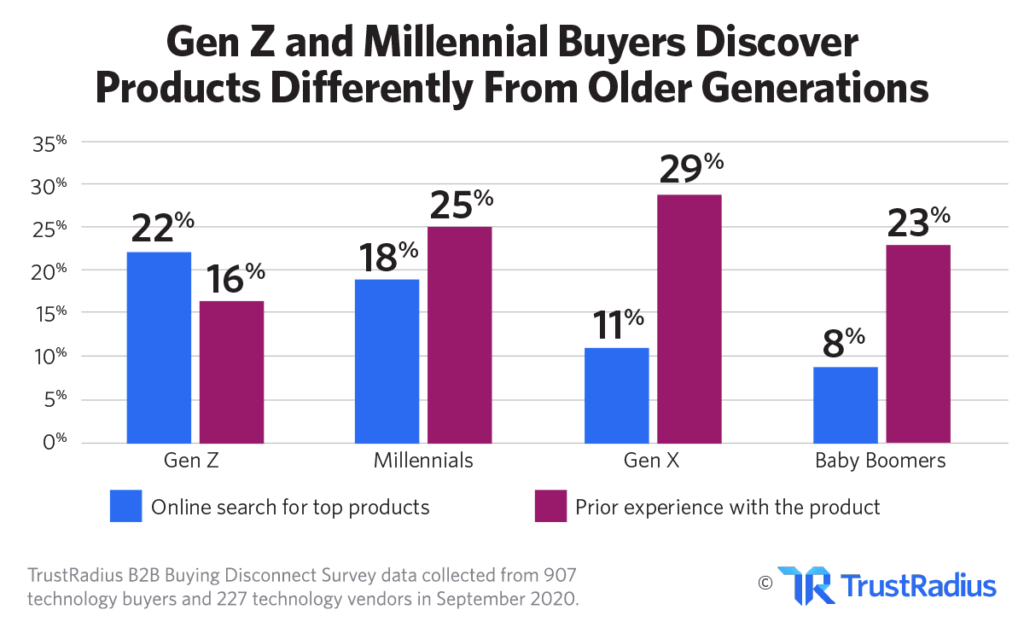
Millennials Are Key B2B Decision Makers
In past years, millennials participated in buying committees led by Gen X decision makers. Now millennials are the most common decision-maker in buying committees across the board.
Nearly half of all lead buyers or financial approvers are millennials—more than any other generational cohort. And they’re not just making “pocket change” purchases either. Millennials are the outright majority of lead buyers for deals up to $100k.
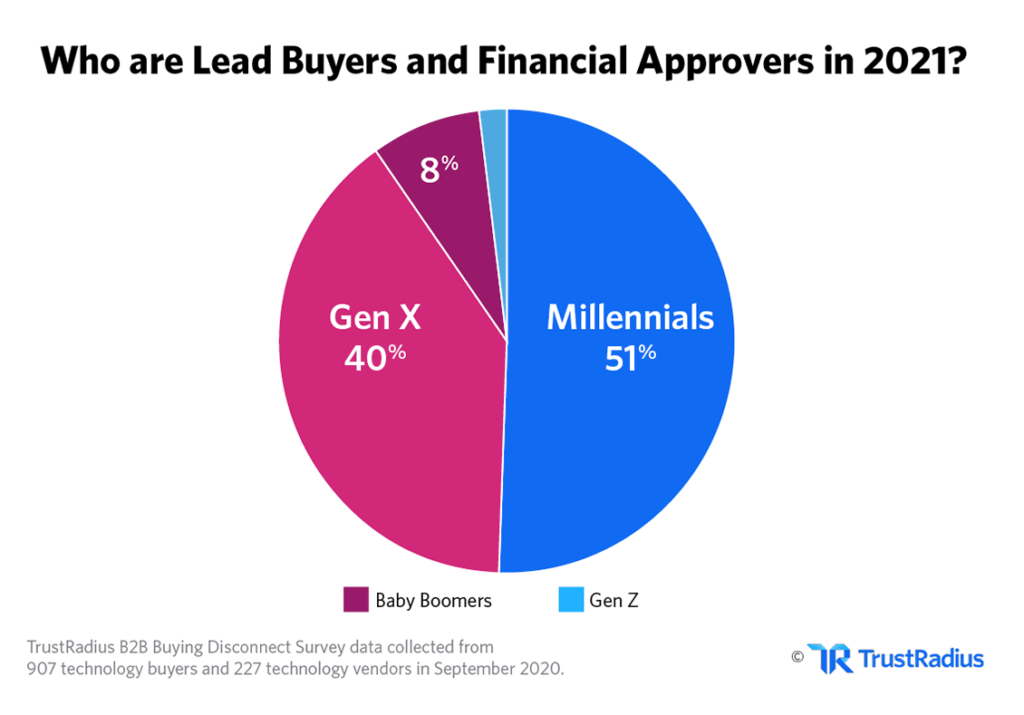
Millennial Buying Committees
Millennials are also the most collaborative technology buyers.
Nearly 60% of buying committees with millennials had four or more members. These are larger than any other age group. B2B tech vendors should be prepared for buying committees to grow in size as more millennials become central players.
Millennial B2B decision makers may be more collaborative internally. But they’re far less likely to “collaborate” with software vendors. We found that 87% of B2B tech buyers want to self-serve their buying journey. 29% of millennials wish they could self-serve the entire journey without ever speaking with a vendor rep.
Gen Z buyers are 35% more likely than any other generation to want a fully self-service buyer’s journey. While Gen Z has yet to fully become a substantive cohort of tech buyers, these early indicators suggest a continuing trend.
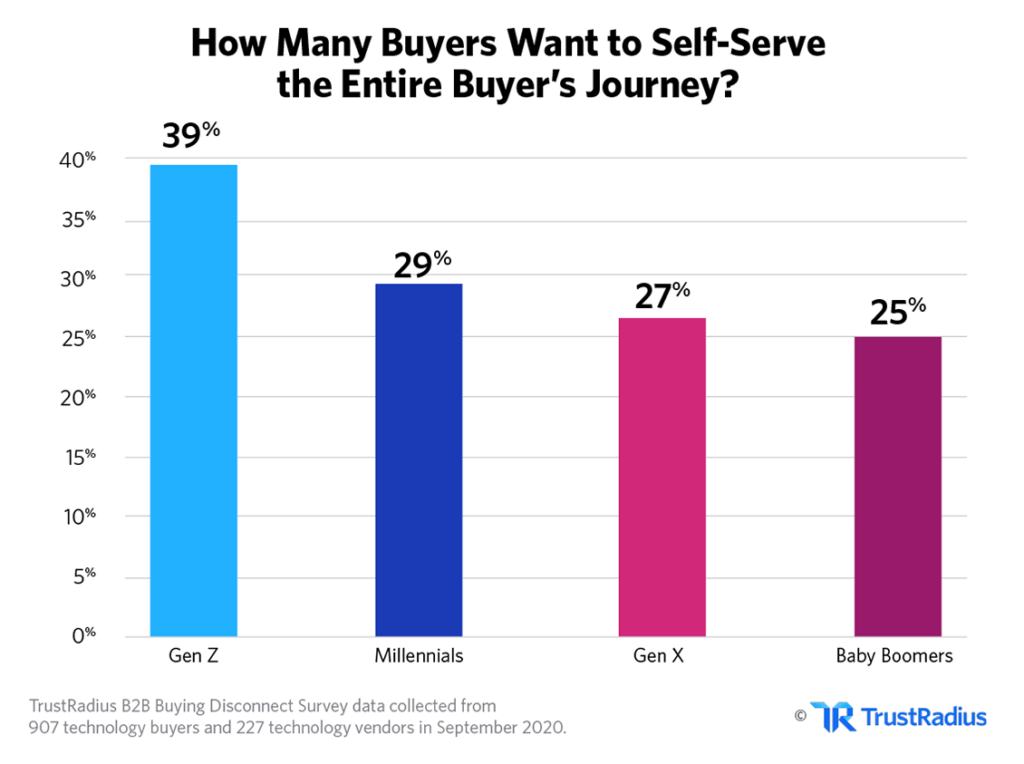
What Resources Do Millennial B2B Buyers Trust?
When it comes to researching products, Millennials put their trust in a few key resources—and analyst reports aren’t one of them.
Millennials are less reliant on analyst resources than prior generations. Only 20% of millennials and 17% of Gen Z reported using analyst reports or rankings.
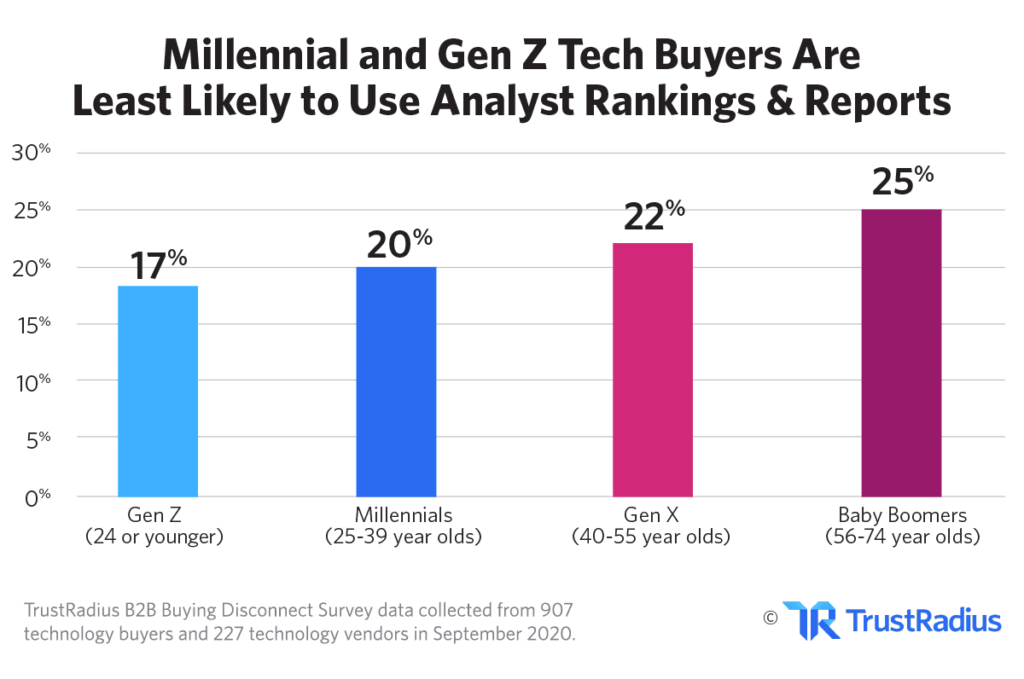
Given that millennials don’t use analyst reports, where are they getting their information?
When it comes to trustworthiness and influence, free trials take the win. They are the peak form of pre-purchase, self-service experience with the product. Unfortunately, only 46% of millennials reported using free trials. They’re not a very common feature offered by vendors even in 2021.
Given that, we weren’t surprised to see millennials using product demos more than any other resource. Making a B2B software purchase without a product demonstration is increasingly rare. Product demos are also among the most trusted and influential resources to millennials.
For nearly half of millennials, user reviews are another key resource picking up the slack. Reviews are also one of their most trusted and influential sources of information. This is especially true in cases where prior hands-on experience with a product isn’t an option.
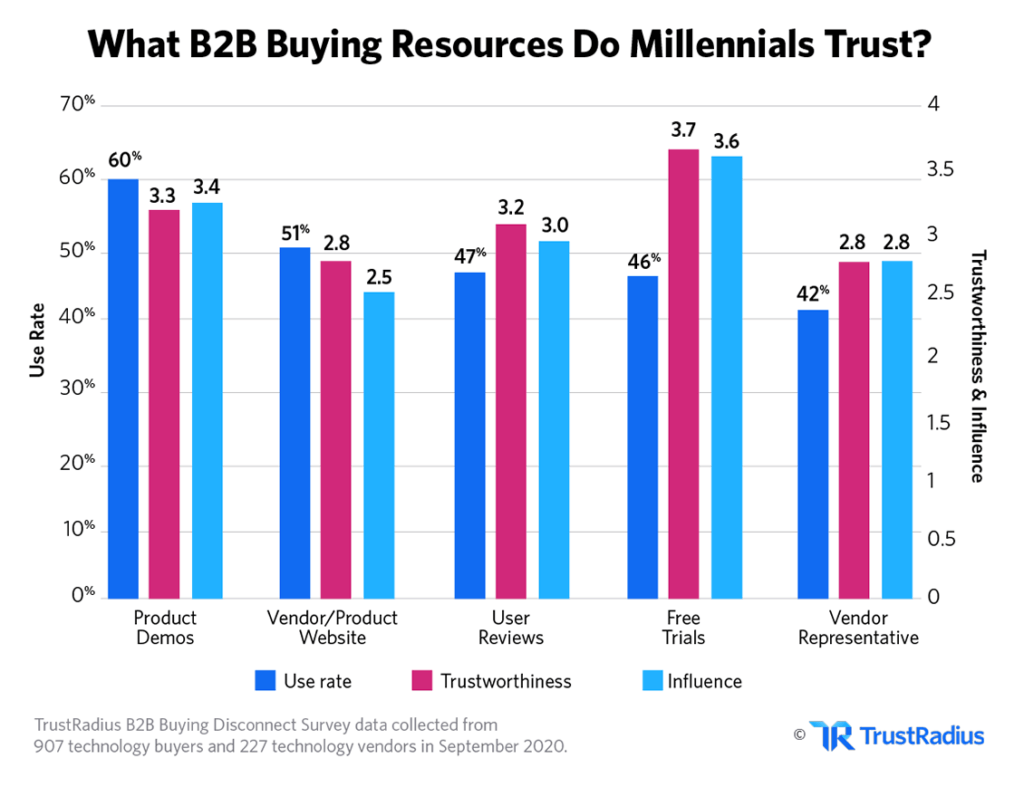
Vendors do still play a role with millennial buyers, according to the data.
Over half of millennials use vendor or product websites to make decisions. And over 40% use a vendor representative in their B2B buying process. Unfortunately, vendor assets and reps were among the least trusted and influential resources.
Vendors are facing a crisis of trust. To get through to millennials, you need to invest in making your product more accessible to them.
Millennials Really Value Self-Service Options
We also asked millennials which resources they’d be most disappointed to lose.
This data shows how important direct experience is to millennial buyers. Obviously, their own experience tops the list. Free trials and product demos were important alternatives.
Millennials also value secondhand experience—with reviews and referrals closing out the top 5 resources they’d be most disappointed to use.
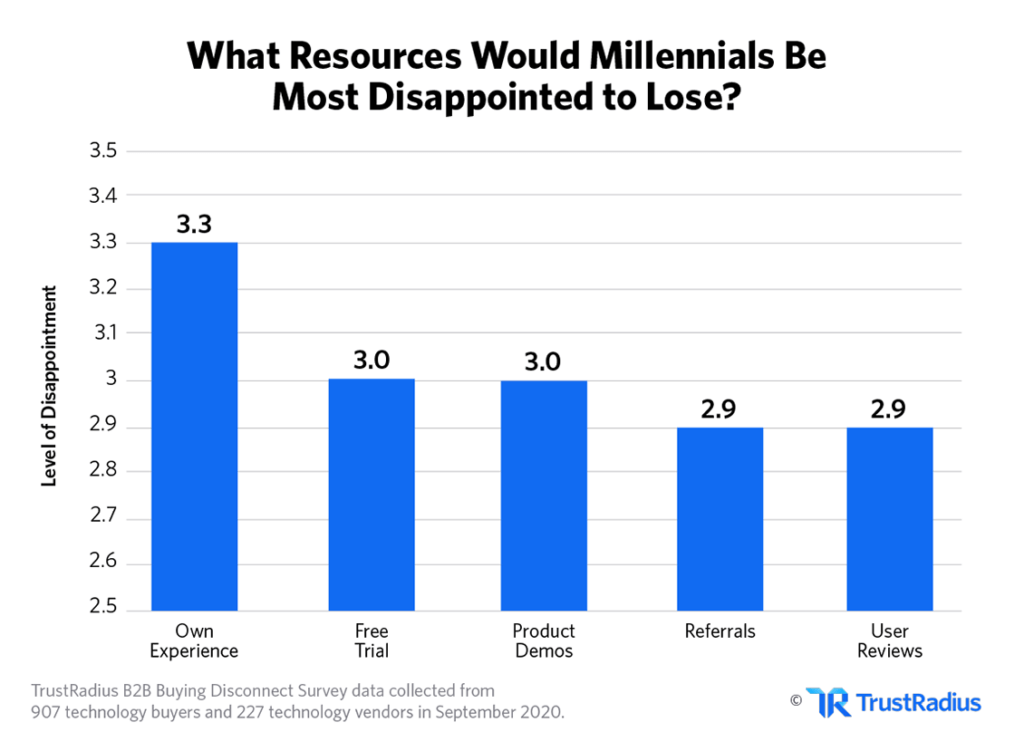
How Millennials Use B2B Review Sites
On review platforms like TrustRadius, Millennial B2B buyers look for qualitative feedback first. They prioritize in-depth review content more than any other generation.
It’s also important for millennials to find reviewers who are relatable to them. They want qualitative feedback that’s relevant to their specific use case. TrustRadius lets you filter reviews by business size, which helps Millennials find what they’re looking for.
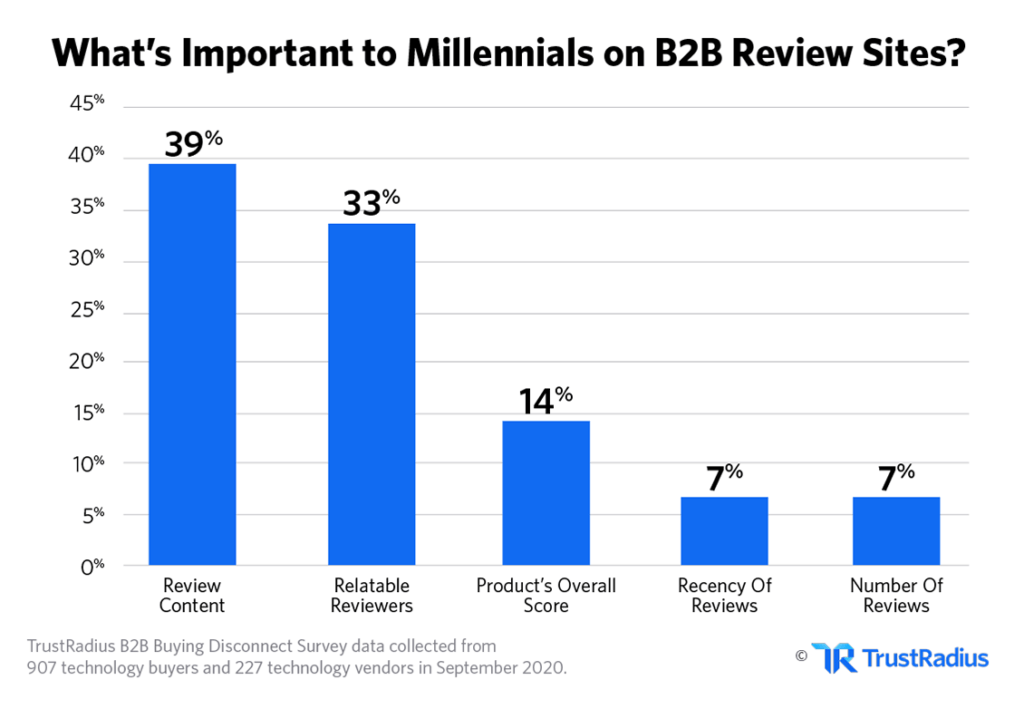
Millennial B2B buyers tend to be more collaborative everywhere—including on review sites.
Nearly half of millennials send reviews they read to four or more people. That’s more than any other generation.
Thanks to millennial buyers, reviews have a multiplicative effect on the buyer’s journey. One review can influence many stakeholders in a single B2B purchase process.
Millennial Tech Spending Trends 2021
Here’s some good news: over half of millennial tech buyers (57%) believe that their tech spending will increase or return to pre-pandemic levels in 2021. They’re the most optimistic generation by far. This may yield very real dividends for software companies in the coming year.
Not all software are created equal here. More millennials expect to increase their spending on marketing (48%) and customer support (40%) than any other generation.
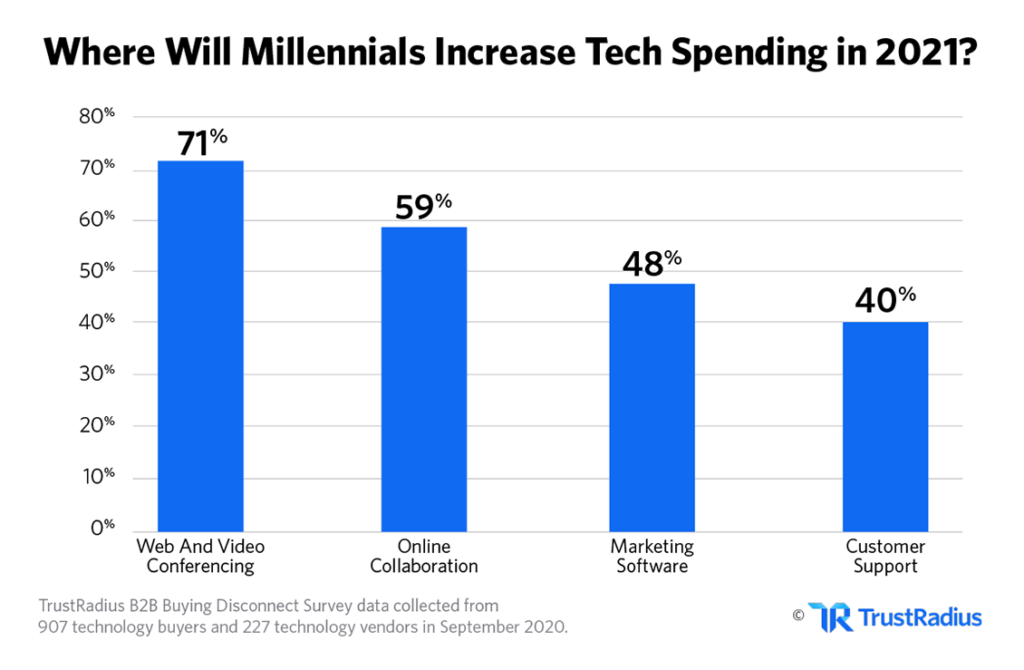
The winning categories in today’s B2B market support the “new normal” of remote work.
71% of millennials expect to increase spending on web and video conferencing solutions. 59% expect to increase their spending on collaboration and project management.
We saw a strong correlation between age and spending expectations here. The younger the buyer, the more likely they are to expect to increase spending. This may suggest that younger buyers think that remote work is here to stay.
Millennials also predicted a few areas where they will decrease spending this year. 23% of millennials think they will spend less on HR tools. 25% think they’ll spend less on vertical industry software. And 24% of millennial buyers think they’ll spend less on routers and switches, which may be a perceived ramification of the move to remote work.
Vendors in these spaces may want to increase their focus on customer success and retention to ensure that they don’t end up on the chopping block.
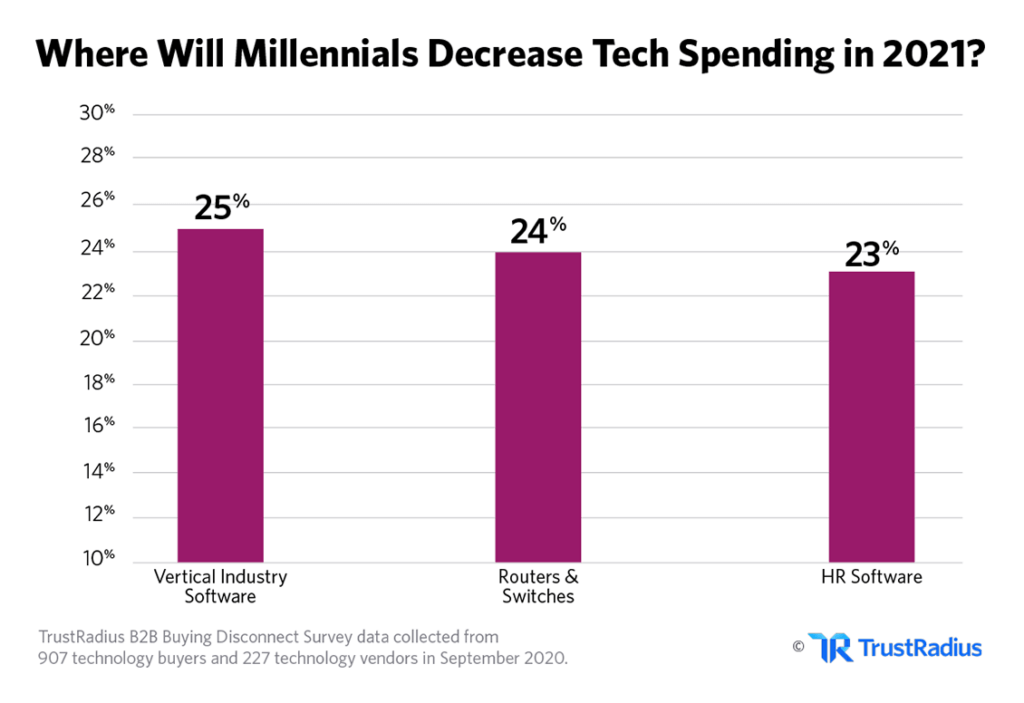
Here’s Why Millennials Don’t Trust B2B Vendors
We’ve been collecting B2B buyer research at TrustRadius for over 5 years now. Some trends from previous years still 100% apply today.
For example, buyers do not trust vendor marketing. And that trend is getting stronger year after year.
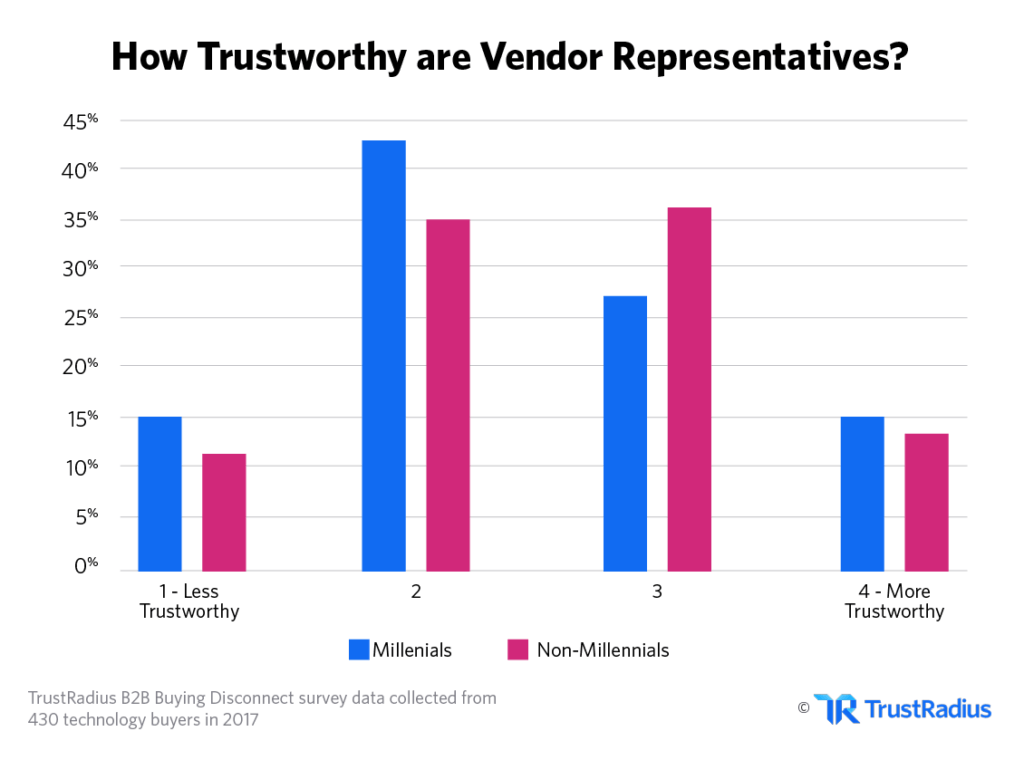
When it comes to vendors and their marketing strategy, here’s what millennials think:
“Company websites are inherently biased towards a positive view of a product”
“While the companies representatives never lied or misled, they are still sales people so I trust them less out of my own suspicion and prejudices”
“They are just looking to make a deal and make their money”
That being said, millennials do appreciate vendors that are forthcoming about their limitations. When vendor reps are upfront and honest, millennial buyers are significantly more likely to accept the deal.
Millennials Really Care About Fair Pricing
One of the only times millennials interact with vendor reps is to confirm product limitations and negotiate pricing.
A B2B sales rep can make or break the deal by providing open feedback, quick responses, and a pricing plan that works.
Here are some qualitative responses from buyers on how they interacted with vendors around pricing:
“They worked with us heavily on pricing. While that can show that they are overpricing us off the bat, it still went a long way.”
“I did like how they accommodated our pricing request”
“The vendor encouraged the final decision with price.”
“They didn’t attack their competitors instead focusing on what they could do for us”
“Vendor provided all the information we were looking for and did not try to hide any limitations.”Overall, the desire to avoid vendor representatives as much as possible throughout the buying process is what uniquely separates millennials from older generations. Non-millennials are more likely to work with vendors more often and for different purposes— but that trust is slowly disappearing from the marketplace as a new generation takes over the B2B decision making role.
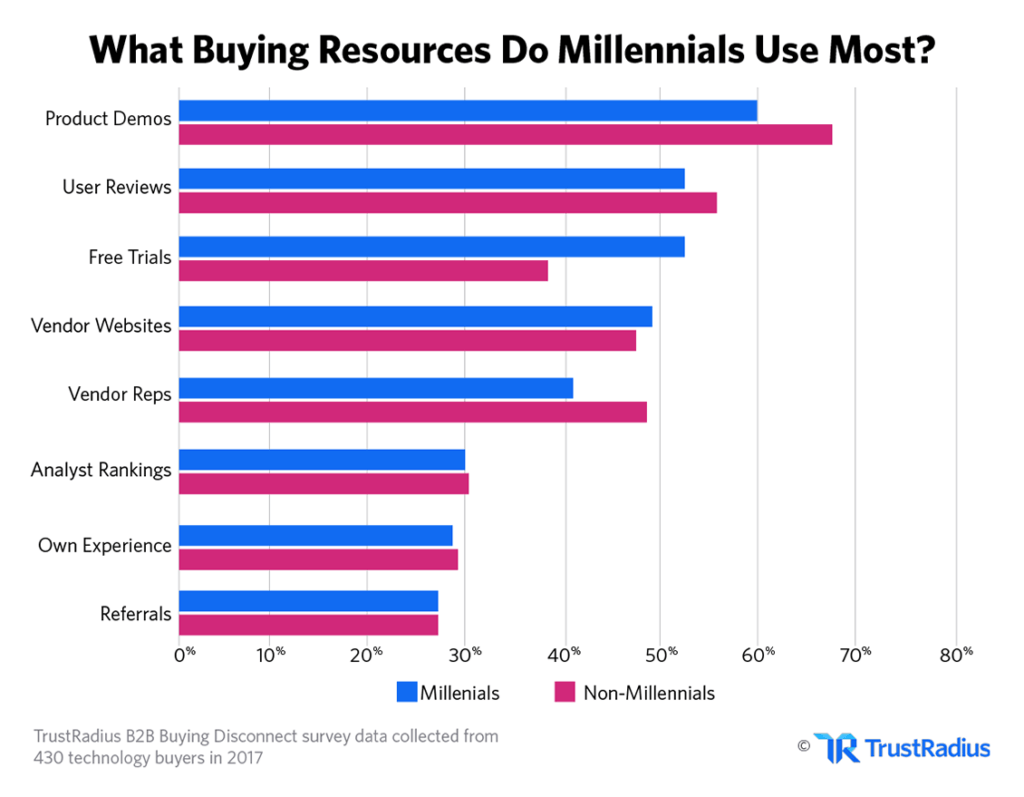
Millennial FAQ For B2B Sellers
B2B sellers of all generations could use a this brief primer on the millennial generation.
How old are millennials?
In 2021, Millennials are roughly 24-41 years old. Generational cohorts tend to be a little fuzzy at the edges. But most experts say the oldest (or “wisest”) millennials were born in the early ‘80’s and the youngest millennials were born in the late 90’s. (Being born in ‘97, the author of this post personally identifies as a “Zillennial.”)
How large is the millennial generation?
Millennials made up 22% of the U.S. population in 2019. They are on track to reach over a quarter of the country’s population soon. Millennials are now the majority (60%) of B2B technology buyers. The millennial cohort includes entry-level to director level employees and a growing number of c-suite executives. They have a significant (and growing) amount of buying power.
What are millennials known for?
The majority of millennials witnessed the evolution of technology and social media firsthand.
They grew up using instant messaging platforms and surfing the internet. Many started out with a Walkman, then moved on to MP3 players before streaming music on every device. They experienced the rise and fall of MySpace. They became early adopters of Facebook and Instagram. And they championed new platforms like Slack and LinkedIn as a new way to do business.
Another thing that makes millennials different is that they were hit hard by the Great Recession early in their careers. Some have never fully recovered. This influenced many perspectives on work, life, professional expectations, and financial decision-making.
What do millennials care about?
According to research from The Case Foundation, Millennials care about social good. They lean into activism. They care deeply about social issues and support the causes they believe in. Millennials often prioritize experiences over material goods. And they tend to value social connections and networking.
In business, millennials value being collaborative. They care about what their peers are doing, and are more likely to use peer-based resources when making purchase decisions. Millennials also tend to place a higher priority on work-life balance than prior generations.
Millennials in the Workforce
As of 2020, millennials are 35% of the American workforce. That makes them the single largest generation in the U.S. labor market, followed by Gen X (33%) and baby boomers (25%).
Roughly 56 million millennials work in the United States alone. So it’s easy to grasp the impact they’re having on the workforce worldwide.
Both Inc. and Forbes describe millennials as much more inclined to look for remote flexibility and work-life balance. However, they’re equally likely to check their work email after hours and on weekends.
This generation is likely to hop from job to job until they find the career that fits them best. They embrace technological upgrades. Millennials consider the negative and positive impacts of automation at great lengths. They’re paving a strong path for Generation Z, who are beginning to enter the workforce.
73% of millennials that work in B2B are involved in the technology purchasing process for their companies. A third are actually the sole decision maker. It’s no surprise that millennial B2B buyers rely on digital channels to research products.
What do Millennial B2B Buyers Want?
In their own words, millennials want three main things from B2B vendors in 2021:
- Increased Support
“I want vendors to hire additional employees to handle increased support requests, which leads to longer wait times for resolutions/answers.”
“Stop using the statement of ‘unprecedented times‘ and making that an excuse for extremely long response times.”
“Ensure solutions offer remote support and strong customer support lines.”
“The market has changed and demand for online cloud based services have increased, impacting current SLA’s. Please don’t let new customers reduce your loyal current customers’ support.”
- More Free Trials
“Offer more free trials – the best way to see if you like a product is to try it!”
“I wish vendors would be more supportive when it comes to your needs and your time and be more flexible when it comes to trial versions and extended trial licenses.”
“Contactless trials and demos would be nice. Making it so that I don’t have to reach out to be approved to just see what the tool can do would make me more likely to proactively try out products when I don’t know whether or not we need them.”
“Extend free trials because we need to respond rapidly so we don’t have time to run through a budget review process to determine if a product is worth it. If they let us trial it that will be the main reason we make the purchase ultimately.”
- Clear and Flexible Pricing
“Vendors should offer clear detailed specs and information on their products and ALSO provide pricing. If pricing is a la carte… provide some examples. Most always, if some kind of pricing is not available online… I will never call and will move on to something else.”
“Come up with creative ways to negotiate spending – i.e., offer per user (if not already), bundle additional options, reduce fees with setup/launch, etc.”
“At times when revenues are strained, it is very important that the ROI from the product is clear, the costs should be very transparent, simple to follow and clearly defined.”
How to Successfully Sell to Millennials
B2B selling to millennials isn’t rocket science— it’s just different.
With all of this information available, you would think that B2B vendors would be prepared to cater to the millennial age group. But research from the TrustRadius B2B Buying Disconnect shows that vendors often don’t get what’s important to millennials.
Here are some action items that will help B2B sellers get on board with the new normal:
Don’t be aggressive.
Millennial buyers make is 57% through the buying process before they’re willing to engage with sales reps. Being overbearing could be a big turn off to a millennial buyer. They’ll see you as pushy and salesy.
Explore new channels.
Try engaging with potential buyers on social media and through their networks. 92% of millennial B2B buyers use social media to engage with industry thought leaders. That’s an opportunity for you to convert those buyers in a more genuine way. Millennials are also more likely to use third-party reviews. If you’re not visible on review platforms, get there.
Train for transparency.
Millennial buyers are contacting you after doing extensive research. They aren’t looking for a pitch. They’re actually reaching out for validation in the form of transparency from your rep. Train your sales reps to really listen to questions and be honest about product limitations. This builds trust and lasting relationships with your millennial customers.
These new tactics are certainly different from the old-fashioned gatekeeping that used to be the norm in B2B. But they are rooted in trust.
If a millennial buyer has a positive experience with your team, they’re not just more likely to buy your product. They’ll act as a referral, write a review, or advocate to the next buyer who is considering you. And that is a millennial buying trend that everyone can embrace.
For more insights into the millennial B2B buyer’s journey, read the B2B Buying Disconnect report from TrustRadius. It’s free here.



